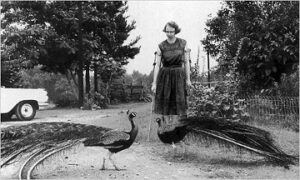
The reader and the writer. Two sides of the same coin. Pardon, the same page. Relationship status: It’s complicated since only one gets to state what’s on their mind. Thus, it’s only fair to talk back via text. Flannery O’Connor (1925–1964) may be long gone from this world, but her literature endures as an eternal message. And so does the question how an atheist-by-conviction connects to Catholic O’Connor’s Southern Gothic religious themes.
Let’s start at the beginning and put the title of this post into context, for instance with O’Connor’s own words from the chapter “The Grotesque in Southern Fiction” in Mystery and Manners, a collection of essays and lectures on writing:
Whenever I’m asked why Southern writers particularly have a penchant for writing about freaks, I say it is because we are still able to recognize one. To be able to recognize a freak, you have to have some conception of the whole man, and in the South the general conception of a man is still, in the main, theological. That is a large statement, and it is dangerous to make it, for almost anything you say about Southern belief can be denied in the next breath with equal propriety. But approaching the subject from the standpoint of the writer, I think it is safe to say that while the South is hardly Christ-centered, it is most certainly Christ-haunted.
O’Connor was both a Georgian and a staunch Catholic, and in her stories, we encounter everything lacking and vile in humanity. In other words: Everything that separates human nature from god according to Christian perception. If there’s holiness, there’s depravity. This dichotomy makes sense even to people without one spiritual bone in their body. What about this statement: What doesn’t make any sense begets faith? To approach this idea from an atheist point of view is like trying to take a picture of the moon: There will never be a satisfactory outcome, yet it seems worth it – maybe precisely because of its elusiveness.
Mystery is both O’Connor’s premise as well as the effect in her writing. There may be the (understandable) temptation to dismiss the words of someone whose assumptions of the world are different from your own – but then a sentence from her short story “Greenleaf” (1956) comes along and upsets everything you thought you understood: “She was a good Christian woman with a large respect for religion, though she did not, of course, believe any of it was true.”
This one line speaks volumes on the character it describes, but it also characterizes the dichotomy we often feel ourselves – believers and non-believers alike. It’s a mystery how some have faith in divinity while others cannot perceive of a world without divine intent. And yet – as O’Connor writes in her essay, “The Nature and Aim of Fiction” – we all have a notion of how to recognize a freak: “The type of mind that can understand good fiction is not necessarily the educated mind, but is at all times the kind of mind that is willing to have its sense of mystery deepened by contact with reality, and its sense of reality deepened by contact with mystery.”
Sentences like these make me want to react and cry out to her: “I don’t believe in the supernatural, but I get your mystery. I disagree with you all the time and yet your writing inspires me not just as a reader and writer, but as a human. How can that be?” And just like that, we’re back to mystery as the alpha and omega in this conversation. If all that sounds exhausting, then that’s because it is.
Christian or not, it’s fair not to want to engage with O’Connor, not least because she held and expressed racist sentiments throughout her life, her racism being entirely deliberate and crucially intertwined with everything she authored. It’s also fair to spend hours on sunny summer days reading O’Connor, trying to come to terms with another incredible paragraph, and knowing damn well that every question it raises will remain unanswered.
3,420 Total Views, 5 Views Today






